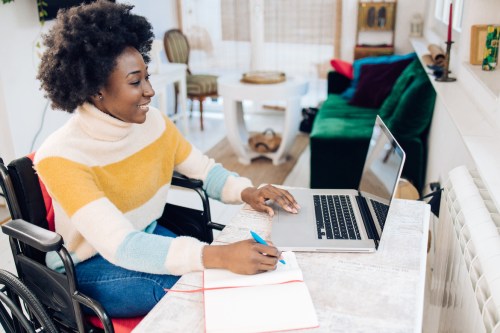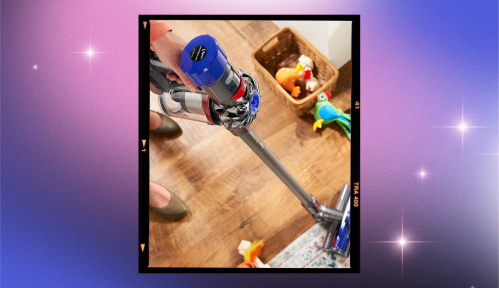October is National Disability Employment Awareness Month (NDEAM). Its goal is to educate all folks about the vast ways people with disabilities contribute to the workplace. While the reality that people who have disabilities also make wonderful employees should come as no surprise, as someone who has a disability, I can promise you there is plenty of awareness to raise.
In a brief ahead of this year’s NDEAM, President Joseph Biden noted research that’s found people with disabilities to be underemployed, looked over for promotions, and paid less than other employees. As a diversity, equity, and inclusion (DEI) consultant, I believe widespread awareness is key for laying the foundation to change that.
One barrier in the way of understanding of how people with disabilities show up in the workplace are many stereotypes that run rampant. Some people assume we need constant assistance, are unable to work, or require special arrangements. Even though these scenarios may be true for some, the disability community is not monolith, and plenty of people who have disabilities are able to work full tilt—like me. I am the founder and CEO of an organizational development firm, and my invisible genetic conditions have not stopped me for a second.
Even so, there are many biases that many people hold and need to abandon with regard to disability and how it “looks.” To illustrate this point, do the following exercise: Take a moment to picture someone with a disability. Do they look like me—someone who has an invisible disability—or did you see someone with a physical signal of their disability status, like using a wheelchair?
Of course, there is nothing wrong at with using a wheelchair or benefitting from an arrangement that will set you up for success. The point here is that just as no two people are the same period, not all people in the disability community are the same, and yet we’re often all lopped together and overlooked.
According to the CDC, 61 million people live with disability in America, so it’s likely someone you work with has a disability, whether or not you know it.
Keep in mind that the disability community includes people who are affected intellectually, mentally, developmentally, cognitively, sensorily, physically, or a combination of more than one factor. And according to the Centers for Disease Control and Prevention (CDC), 61 million people live with disability in America, so it’s likely someone you work with has a disability, whether or not you know it.
So what can you do to help during National Disability Employment Awareness Month and beyond? Here is a simple list to help raise consciousness in your workplace and be an effective ally.
4 ways to be an ally to the disability community at work
1. Remember that words are powerful
“Handicapped” is a word of the past; disability, though, is not a bad word. Say it at home, at work, and with friends. When possible, use person-first language, as well. So, I am a person with disabilities, not a disabled person. This helps to communicate that I am a human being who is not defined by my disabilities; it is just one facet of all that I am.
Also, if you do not have a disability, don’t say you are “able-bodied.” Rather, say you are non-disabled. That distinction is key because, for instance, I have the ability to do things like people without disabilities, I just may do them differently due to my disability. Furthermore, by using “non-disabled,” you bring disabled folks into the conversation, which helps to normalize the stigma around the word and people with disabilities in general.
2. Don’t label disabled people by their assistive device
For example, say “a person who uses a wheelchair” instead of “a person in a wheelchair.” The difference grammatically is minor but the impact is major. A wheelchair is an assistive device to allow for mobility and independence. The person is not in a wheelchair and shouldn’t be defined as such.
3. Do something at work to celebrate NDEAM
Resources abound to make change in the workplace, including policy review, education opportunities, hiring practices, and more. Start by normalizing disability in the workplace as something to be celebrated, not something that should be hidden or pitied.
How can you do that? One idea is to advocate that you hire people in the disability community. There are recruiting firms and job boards specific to folks with disabilities, like AbilityJobs, and Chronically Capable—advocate for your workplace to use those. Other great options to advocate for change in the workplace include sponsoring events and activations for disabled communities and educating people about disability.
4. Bring in a speaker to your workplace
Speakers who have disabilities can share their experience and help employees at your company advocate for staff members with disabilities. Storytelling is a powerful way to learn and unlearn beliefs about disability. (Hint: I’m a disability speaker, along with a number of people in my network, including Kelsey Lindell, Catarina Rivera, Leon Ford and so many others.)
Ultimately, it’s crucial that all people—not just those who have disabilities—function as a disability ally at work in order for productive change to be made. Folks with disabilities have huge contributions to offer workplaces, and that reality needs to be realized and normalized. We just need folks to see us so we have the opportunity to shine.
Sign Up for Our Daily Newsletter
Get all the latest in wellness, trends, food, fitness, beauty, and more delivered right to your inbox.
Got it, you've been added to our email list.











